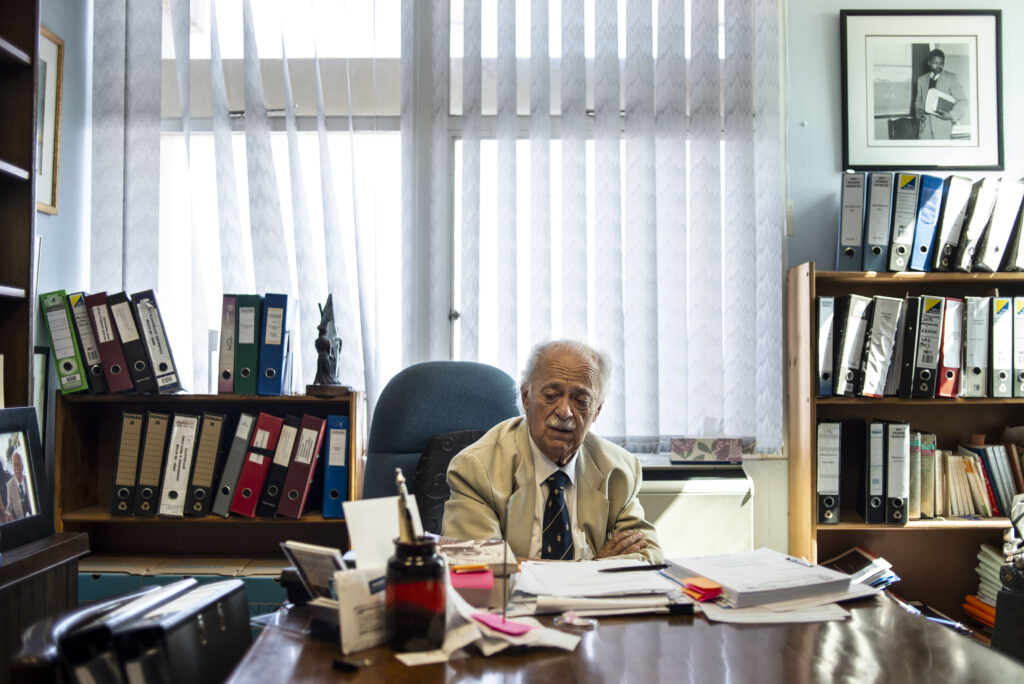As a human rights lawyer, during the apartheid ere, Bizos dedicated his career to fighting for fundamental human rights.
The godfather of human rights, George Bizos, passed away at the age 92 of natural causes at his home on Wednesday afternoon.
As a human rights lawyer, during the apartheid ere, Bizos dedicated his career to fighting for fundamental human rights. He spearheaded cases of anti-apartheid activists such as Winnie Madikizela-Mandela and Oliver Tambo. As a member of the ANC defence team in the Rivonia trial, he represented Nelson Mandela, Walter Sisulu, Govan Mbeki and others who faced the death penalty, between 1963 and 1964.
After apartheid ended, he continued to offer legal counsel for the marginalised. In 1996, he represented the families of Steve Biko and Chris Hani at the Truth and Reconciliation Commission (TRC). The TRC’s aim was to bring about reconciliation and healing by uncovering truths about human rights violations that had occurred during apartheid.
In one of his last major cases, as senior counsel at the Legal Resources Centre (LRC) and the Constitutional Litigation Unit, he represented some of the families of the 34 striking miners who were massacred by the South African Police Services on August 16 2020 outside the Lonmin platinum mines on the fringes of Marikana.
In a 2012 article in the Mail & Guardian, Bizos said that he believed that Marikana was a watershed moment in post-apartheid South Africa and the violation of human rights that had occurred there “saddened” him.
Bizos also helped seek justice for apartheid activist Ahmed Timol, who was allegedly murdered in 1971 by a former security branch police officer Joao Rodrigues. The case was reopened in 2017.
Bizos also helped draft the post-apartheid South African Constitution.
The LRC and its Constitutional Litigation Unit, where he consulted and monitored lawyers since 1991, released a statement on Wednesday to “salute” him. The LRC statement added that Bizos made “an enormous contribution to the ongoing work of the centre”, describing him as “always seeking justice for victims of injustice”.

He was also instrumental in establishing SAHETI school, a private Hellenic school in Johannesburg, in 1974, as well as supporting it with a scholarship and bursary fund in his name.
Speaking during an engagement with the South African National Editors Forum (Sanef) last night, President Cyril Ramaphosa described him as a” legal eagle in our country”.
“His name was a family name, a well-known name and he had an incisive legal mind and was also one of the architects of our Constitution who contributed immensely,” said Ramaphosa, adding that he “will solely be missed”.
”We dip our heads in honour of the contribution that George Bizos has made to our democracy. We will forever remember his contribution,” he said.
Justice and Correctional Services Minister Ronald Lamola said: “Not many legal practitioners confronted the injustices faced by political activists more than Bizos, and his work will continue to inspire a generation of upcoming practitioners. We are grateful for the lasting legacy he has left.”
“We commiserate with his family, loved ones, colleagues and all who knew him. The outpouring of grief in the legal profession and throughout the country bears testimony to the noble role that Advocate Bizos played.”
Business Unity South Africa said: “Bizos played a pivotal role in the struggle for the democracy we enjoy. He was the exemplification of ethical, moral, strong, brave, and humble leadership. He always spoke truth to power, be it against the apartheid regime or against the corruption in leaders in our society today.”
Bizos was born in 1927 in Kirani, Greece. He arrived in South Africa in 1941, at the age of thirteen, with his father.
Arriving in Durban, he later settled in Johannesburg, where he completed his law degree at the University of Witwatersrand in 1950 and was admitted to the Johannesburg Bar in 1954, became a senior counsel in 1977 and served on the Bar until 1990. He held numerous honorary and other positions, including an appointment to the Judicial Services Commission in 1994, and as a judge of the Appeal Court in Botswana from 1985 to 1993.